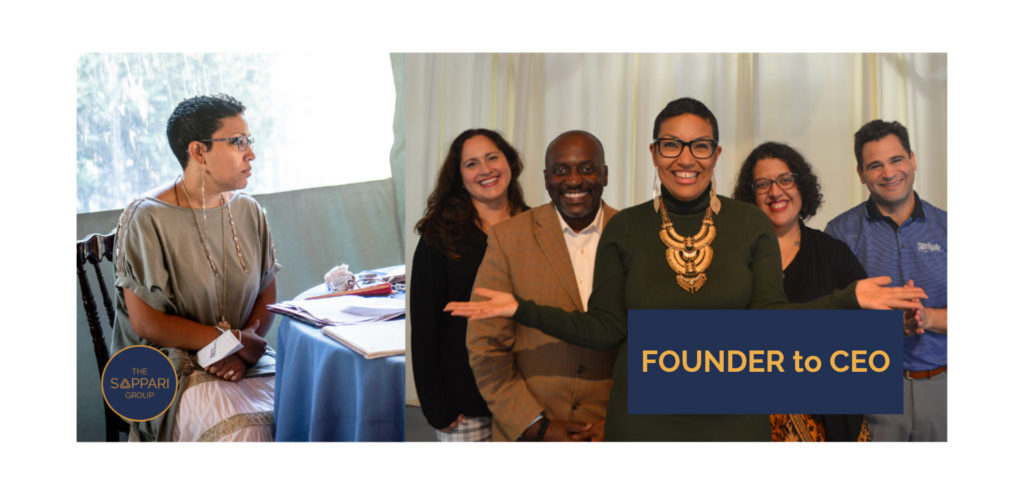
If you are a company founder, you may be tinkering with taking on the title of CEO of your business. Maybe you’ve already added that title on your LinkedIn profile.
Just having these thoughts brings up a question, is there a difference between founder and CEO? If so, what is the job of a small business CEO?
Let’s clarify this quickly. There IS a difference between Founder and Chief Executive Officer. In a small business this distinction can be more subtle, hence the confusion you may already be experiencing.
The easiest way to explain the differences in the roles is to look at the job description of a CEO.
As you may have already realized, just because you’re the founder or owner of a business doesn’t mean you are that organization’s CEO.
While a large company may have clearly delineated the roles and responsibilities of Founder and the CEO (or CEOs) of each company, a small business founder is creating these distinctions while simultaneously running the company. The roles can be a little blurry.
And, there is a good chance you, as the founder, are shifting into the role of CEO as your company grows.
Have you ever seen a job opening for “Founder” on Indeed?
When I am trying to understand a role and how companies implement that role, I will often look at job postings and descriptions on Indeed. What I have not seen yet is an opening for ‘Founder’.
Try it for yourself now. Head to Indeed.com and do a search for ‘Founder’. Let me know what you come up with.
Indeed does have something to say about the founder, though. They define this person as, “a business professional who starts a company. Founders take an idea and use their own skills and knowledge to build a business from nothing. They assume all risks associated with the venture and often use their own capital to establish the company.” Indeed Editorial Team, September 2022 “What is a Founder? FAQ with Steps to Starting a Business”
What is the difference between Founder and CEO?
The founder creates the business and infuses it with all the energy, creativity, organization, money, resources, etc to get it off of the ground. However, in the founder role you may not be tapping into the skills that are needed to operate the company and scale it over time.
So what is the difference?
The Founder:
- Can never be replaced;
- Works on and in the business;
- May hold every role;
- May not be paid if the structure is not set to do so.
The CEO:
- Can be hired (or fired).
- Holds a paid position
- Fulfills the 12 functions below
The Small Business CEO Job Description
- Holds the vision of the company.
Your job as a CEO is to know where your business is going, and what your company stands for. - Ensures and explores revenue generation.
In addition to holding your company’s vision, you have to explore ways to acquire funding and revenue streams as a CEO. It’s how you can ensure the vision you have for your company comes true. - Develops the strategic plan.
CEOs need to create a plan for their company. Assess where their business is and the steps they have to take in order to implement their vision. - Leads and motivates a high-performing managerial team.
The buck stops with the CEO as the leader of the company. It’s their job to lead but to also define, foster, develop and motivate their managerial team. - Oversees operations and business activities.
This might seem like a given, but CEOs need to be active in their company’s operations and daily procedures. - Solves problems.
Problem-solving is in the DNA is second-nature to any business professional. As the CEO of your company, it needs to be your specialty. - Closes the big deals.
This ties in with many of the other aspects of the CEO Identity. Closing deals and making partnerships are how you support your company’s vision, implement your strategic plan, and generate revenue and you do this with your most important business relationships. - Maintains the big external relationships.
Networking and maintaining relationships for your company are crucial to how you can step into your role as a CEO. - Has a pulse on the industry and market.
For any business professional, it’s important to stay tapped into current events and trending topics. - Defines the roles and responsibilities.
Just as we are defining the CEO’s roles and responsibilities, you need to do that for your entire organization. - Occasionally steps in to do the work.
Leaders lead by example. While CEOs have other responsibilities, you shouldn’t be afraid to do the work that needs done. - Pursues self-mastery.
Self-improvement and learning new skills doesn’t stop when you become the head of your company. We never stop learning, we never stop trying to be better than we were yesterday.
As a CEO, you’re always pursuing betterment and self-mastery.
Bottom Line
In order for you to transition from founder to CEO, you have to embrace your CEO IdentityTM.
Your CEO IdentityTM requires you to embrace opportunity and the work ahead of you.
Opportunity doesn’t always feel good. It can feel uncomfortable at times, which makes us want to return to what is certain. But it’s those uncomfortable situations that challenge us and force us to grow character and skills.
In the following weeks, I’ll dive more into each of the CEO responsibilities. For now, ask yourself this: What’s one small step you can take today to close the gap between where you are now and where you want to be?

About Nettie
Nettie Owens, CPO-CD® is an internationally recognized and award-winning expert, author and sought after speaker on accountability and productivity. Owens’ methodologies are brain-based, researched and backed by science. Through training, speaking, coaching, writing, and more than 100 video interviews on “What Businesses Need To Know Right Now,” (also the name of her latest book, Vol 1 and 2) she brings over 19 years worth of ideas on productivity, accountability, leadership, and entrepreneurship to the community and beyond. She seeks to create an environment of success where all voices are heard.

